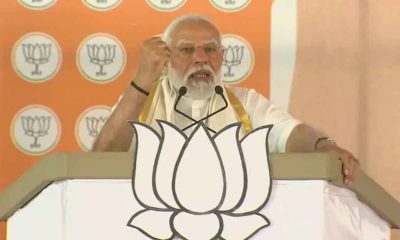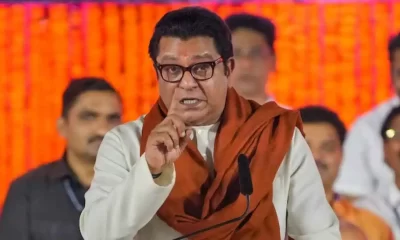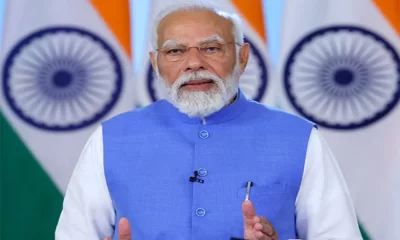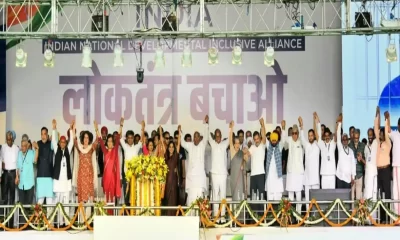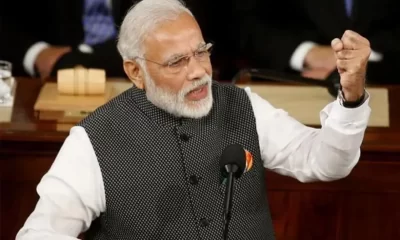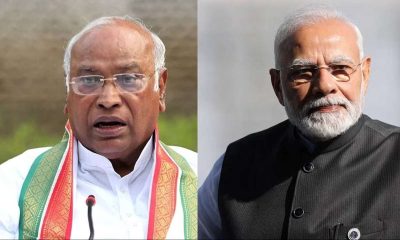India News
PM leaves for first ever Israel visit
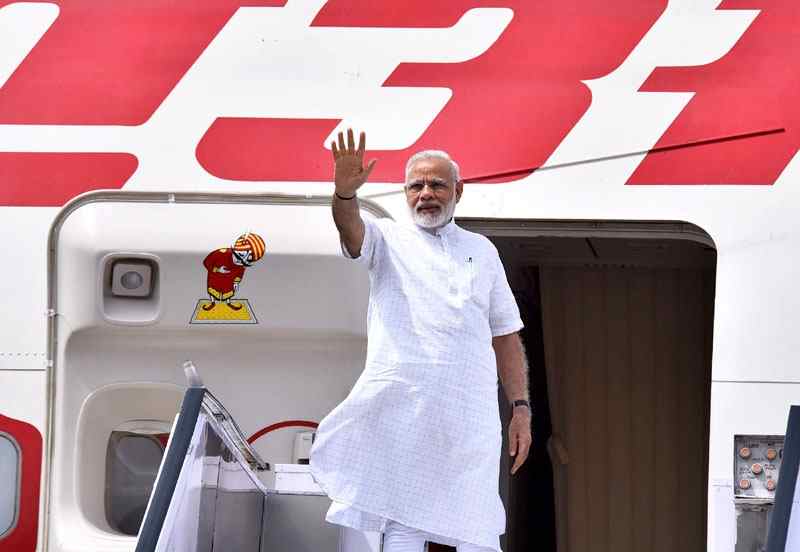
[vc_row][vc_column][vc_column_text]Haretz expects BJP will anchor ties with greater alacrity
Prime Minister Narendra Modi left for his three-day visit to Israel Tuesday morning, being the first Indian PM to land in that country. His Israeli counterpart Benjamin Netanyahu and his senior ministers and large number of dignitaries will receive him at Tel Aviv airport, the rare honor given to Pope and the US President.
At the end of his Israel visit, PM is scheduled to visit Hamburg in Germany from June 6 to 8 for attending G-20 Summit.
In a series of Facebook posts, Prime Minister said “I will be visiting Israel on 4-6 July, 2017 upon invitation of Prime Minister Benjamin Netanyahu. As the first Prime Minister to do so, I am greatly looking forward to this unprecedented visit that will bring two countries and people closer. This year India and Israel are marking 25 years of our diplomatic relations.”
While describing his priorities during the visit Prime Minister said, “I will have in-depth talks with Prime Minister Netanyahu on the full spectrum of our partnership and strengthening it in diverse fields for mutual benefit. We will also have the chance to discuss major common challenges like terrorism.”
He said, “I will visit the Yad Vashem memorial Museum to honor the memory of the victims of the holocaust that counts among the greatest tragedies in human history. Later, I will also pay my respects to the courageous Indian soldiers who laid down their lives during the liberation of Haifa in 1918.”
In one of his tweets PM expressed his enthusiasm for meeting his Israeli counterpart.[/vc_column_text][vc_raw_html]JTNDYmxvY2txdW90ZSUyMGNsYXNzJTNEJTIydHdpdHRlci10d2VldCUyMiUyMGRhdGEtbGFuZyUzRCUyMmVuJTIyJTNFJTNDcCUyMGxhbmclM0QlMjJlbiUyMiUyMGRpciUzRCUyMmx0ciUyMiUzRUklMjBsb29rJTIwZm9yd2FyZCUyMHRvJTIwaG9sZGluZyUyMGV4dGVuc2l2ZSUyMHRhbGtzJTIwd2l0aCUyMG15JTIwZnJpZW5kJTJDJTIwJTNDYSUyMGhyZWYlM0QlMjJodHRwcyUzQSUyRiUyRnR3aXR0ZXIuY29tJTJGSXNyYWVsaVBNJTIyJTNFJTQwSXNyYWVsaVBNJTNDJTJGYSUzRSUyMCUzQ2ElMjBocmVmJTNEJTIyaHR0cHMlM0ElMkYlMkZ0d2l0dGVyLmNvbSUyRm5ldGFueWFodSUyMiUzRSU0MG5ldGFueWFodSUzQyUyRmElM0UlMkMlMjB3aG8lMjBzaGFyZXMlMjBhJTIwY29tbWl0bWVudCUyMGZvciUyMHZpYnJhbnQlMjBJbmRpYS1Jc3JhZWwlMjB0aWVzLiUzQyUyRnAlM0UlMjZtZGFzaCUzQiUyME5hcmVuZHJhJTIwTW9kaSUyMCUyOCU0MG5hcmVuZHJhbW9kaSUyOSUyMCUzQ2ElMjBocmVmJTNEJTIyaHR0cHMlM0ElMkYlMkZ0d2l0dGVyLmNvbSUyRm5hcmVuZHJhbW9kaSUyRnN0YXR1cyUyRjg4MTg1MTQ5NDA2Mzk0MzY4NCUyMiUzRUp1bHklMjAzJTJDJTIwMjAxNyUzQyUyRmElM0UlM0MlMkZibG9ja3F1b3RlJTNFJTBBJTNDc2NyaXB0JTIwYXN5bmMlMjBzcmMlM0QlMjIlMkYlMkZwbGF0Zm9ybS50d2l0dGVyLmNvbSUyRndpZGdldHMuanMlMjIlMjBjaGFyc2V0JTNEJTIydXRmLTglMjIlM0UlM0MlMkZzY3JpcHQlM0U=[/vc_raw_html][/vc_column][/vc_row][vc_row][vc_column][vc_column_text]Before the arrival of PM Modi in Tel Aviv, Israel on Monday backed India on the issue of terror threat from Pakistan. Mark Sofer, Deputy Director General in-charge of the Asia Pacific Division at Israeli foreign office told an Indian journalist on Monday, “Israel supports India on terrorism emanating out of Pakistan, hook, line and sinker. But we are not asking quid pro quo… the horrors coming from Pakistan…the Lashkar-e-Toiba, the rogue operations from Pakistan. We say India has the right to defend itself, just like Israel has right to defend itself. I don’t see difference between LeT and Hamas. A terrorist is a terrorist is a terrorist.”
The Israeli officials described Modi’s visit as “historic and special”. According to sources the groundwork was prepared by “seven pre-visits” from different ministries and departments from India.
Prime Minsiter Modi will skip visiting Palestinian territory during his Israel visit. Traditionally, most foreign dignitaries visit both sides of the rival territories. Recently, US President Donald Trump had also visited Ramallah, the headquarters of Palestinian Authority.
While discussing about Modi skipping visit to Palestinian territory, the Israeli official was quoted as saying there was “nothing sinister or special” about this. “Israel has de-hyphenated its relationship… and PM Modi’s visit is a bilateral visit”, he added.
Haaretz, an important Israeli newspaper, while discussing PM’s visit on Tuesday, analyzed as to how relations passed through different phases between the two countries. It said that the two leaders would mark a significant warming up of ties and express fulfillment of a long unrequited desire, dating back to the early days of the Jewish state, for close ties with, and recognition from, India.
Discussing the historical perspective, the daily said, “In those early days, David Ben-Gurion (primary founder and the first PM of Israel) and other key Zionist leaders made strenuous bids for political and diplomatic support from Indian nationalist leaders like Mahatma Gandhi and Jawaharlal Nehru.”
Referring to Albert Einstein’s letter to Jawaharlal Nehru pleading to establish ties with Israel written in the summer of 1947, the daily said, “But not even Einstein could convince Nehru. India voted against the UN partition plan of Mandate Palestine in 1947 and later, in 1950, extended recognition to the state of Israel but without establishing diplomatic relations.” In fact Ben-Gurion asked Albert Einstein to write letter to Nehru at that time.
Complaining about India’s attitude those days, the newspaper said, “In the absence of any ideological or diplomatic support from Gandhi for Zionism, or later from the Indian Republic for Israel, it was an unusual and difficult affection for Ben-Gurion to carry – much like a one-sided love affair.”
Haaretz further said that, “Self-determination for the Palestinian people was significant issue for Nehru, who gave them strong support and turned away from relations with Israel. There was a regional political consideration for India in the 1950s: the Kashmir dispute with Pakistan. India hoped for Arab support for the Indian case against Pakistan by extending its strong support to the Palestinians and not towards Israel.”
Discussing about the reasons for changed India’s policy towards Israel, the daily said, “First, the end of the Cold War and the collapse of Soviet Union created a new diplomatic matrix for India. Indian foreign policy was revised. Second, Israel was an excellent source of armaments and defense systems just as the Soviet Union and its associated weapons industries were crumbling. India’s poor military capabilities played a crucial role in opening relations with Israel.”
The daily revealed that during 1962 war with China, Nehru himself wrote a letter to Ben-Gurion asking for help in November that year.
While concluding its analysis, the daily said, “And India’s governing party, the Bharatiya Janata Party, a long time advocate of Israel in the Indian political system, is likely to anchor India’s ties with Israel with even great alacrity. That would indeed be a realization of Ben-Gurion’s long-held but frustrated hopes of decades ago.”
PM Modi travelled to Israel in 2006 while he was Gujarat Chief Minister. President Pranab Mukherjee travelled to Israel in 2015 and addressed Israeli Parliament.[/vc_column_text][/vc_column][/vc_row]
2024 Lok Sabha Elections
Bollywood actor Neha Sharma campaigns for her father Ajit Sharma in Bhagalpur, Bihar
The Bollywood actor posted a video on her Instagram handle which showed her journey through various districts of Bihar, including Kishanganj, Banka, Purnea and Katihar. She was dressed in a traditional salwar kameez and was seen greeting and encouraging the public to cast their votes.
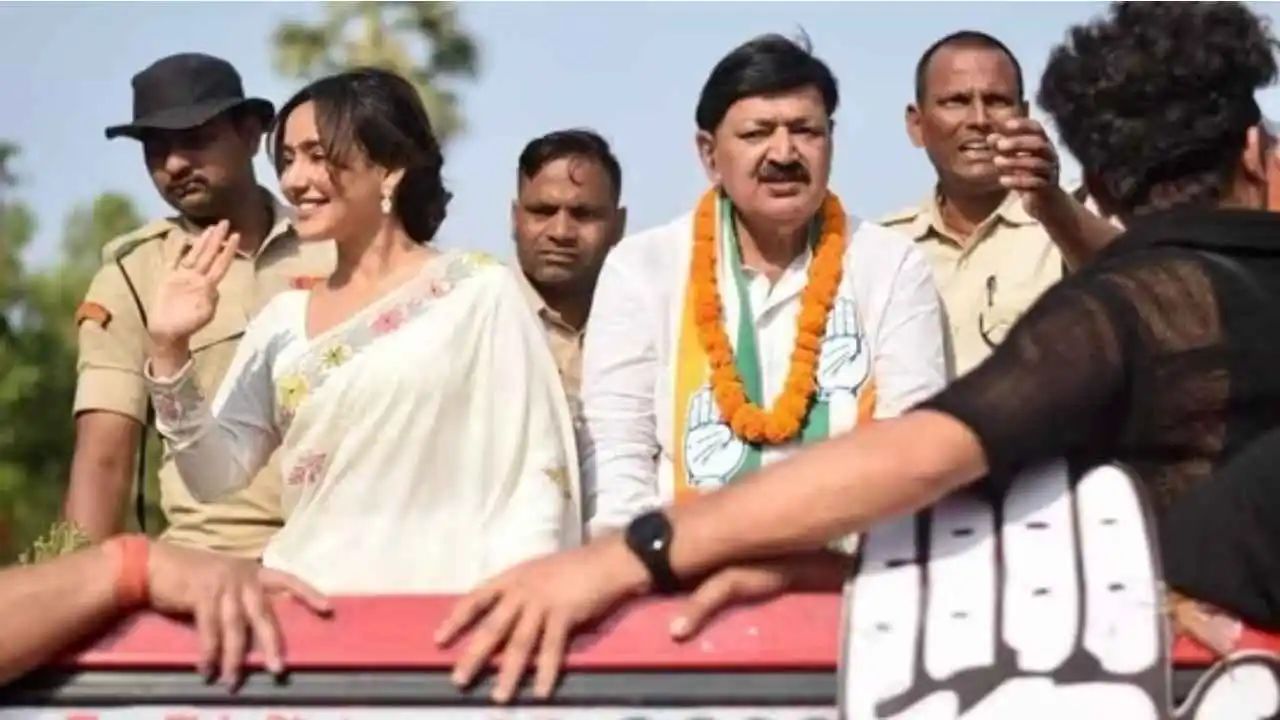
Bollywood actor Neha Sharma’s recent participation in a roadshow in Bihar has taken the internet by storm. Sharma, known for her roles in films like Tum Bin 2 and Crook, was seen supporting her father, Ajit Sharma, who is contesting from Bhagalpur Lok Sabha seat on a Congress ticket. The roadshow came amid speculations that the actor might enter politics. But, it is now clear that she was just campaigning for her father.
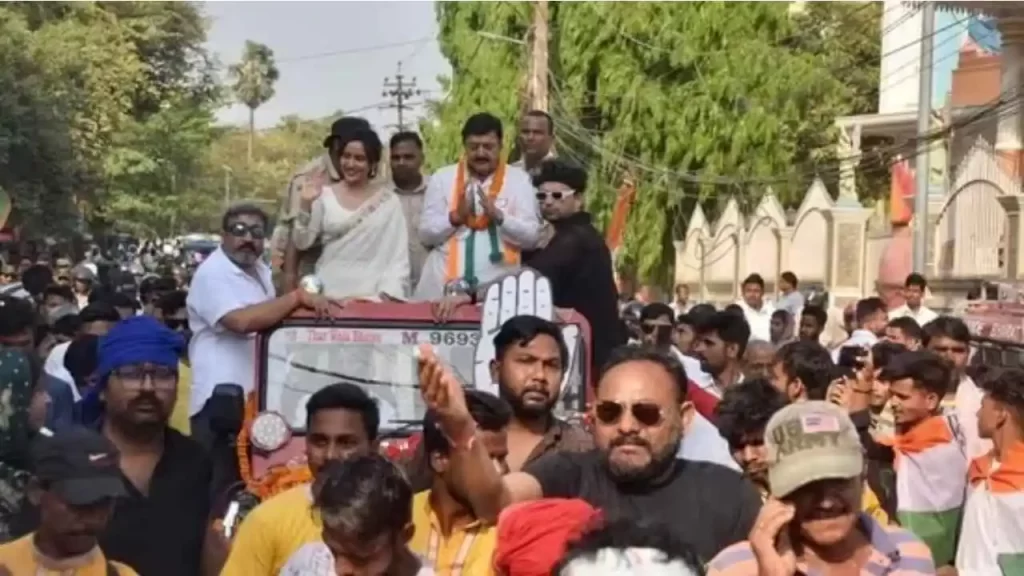
The Bollywood actor posted a video on her Instagram handle which showed her journey through various districts of Bihar, including Kishanganj, Banka, Purnea and Katihar. She was dressed in a traditional salwar kameez and was seen greeting and encouraging the public to cast their votes.
The actor received a warm reception and love from a large crowd in Pirpainti and Kahalgaon during her roadshow. She wrote on Instagram that it is said when someone gives one a place in their heart, then they live there forever. She said her heart is full of all the love and support she was receiving from the people. She thanked the people for the warm welcome she got in Pirpainti and Kahalgaon. Aapka pyar sar ankhon par.
Another video, circulating on social media showed the actor actively participating in her father’s election campaign in Bhagalpur. The election to the Bhagalpur Lok Sabha seat is set to take place in the 2nd phase on April 26. Ajit Sharma is representing the Congress and is up against JDU’s Ajay Kumar Mandal in this seat.
Earlier, there had been rumours and speculations that Neha Sharma might join politics. But many reports have clarified that she is not making her political debut yet. The Bollywood actor had been offered the opportunity to join politics by her father Ajjit Sharma but she is currently focusing on her acting career.
Education
Farmer’s son Nilkrishna Gajare Nirmalkumar from Maharashtra scores 100 NTA score in IIT-JEE Mains 2024
Nilkrishna Gajare’s father is a farmer and had to discontinue his own education after Class 12 as he faced financial difficulties. Gajare faced financial challenges growing up. However, his unwavering dedication and strategic approach to preparation set him apart from the crowd.
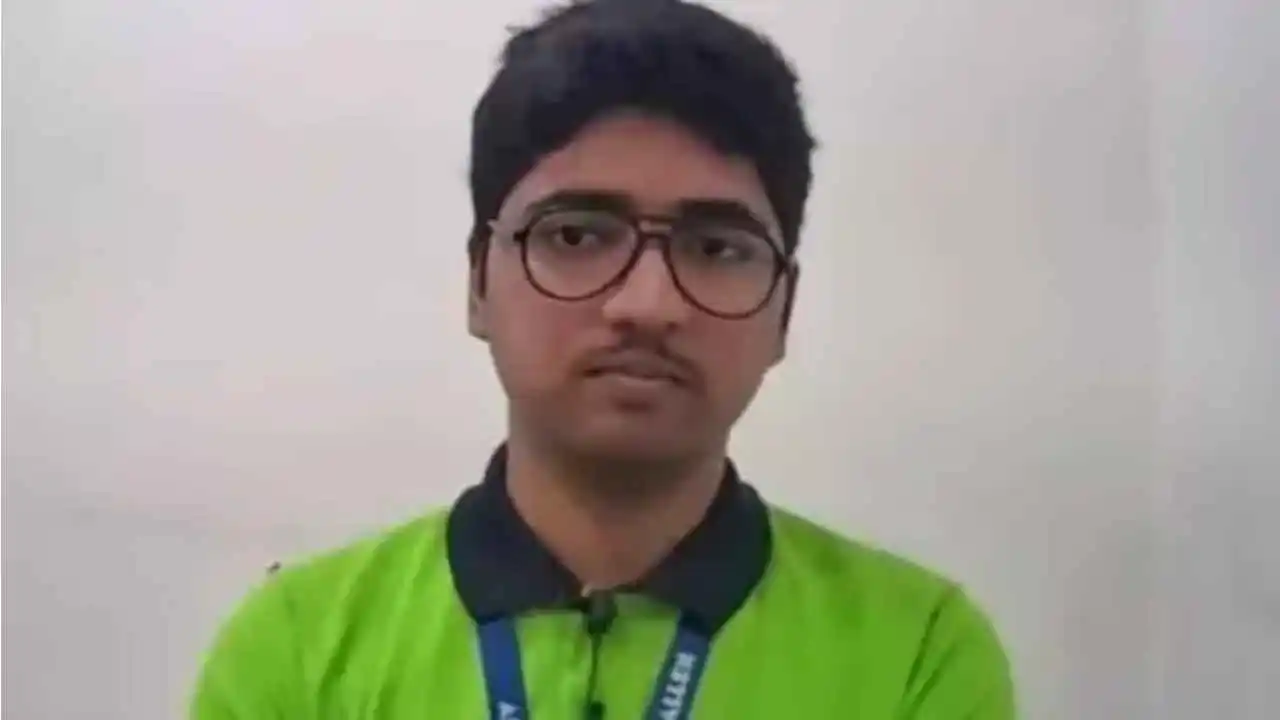
Nilkrishna Gajare, who hails from Maharashtra’s Washim, achieved an extraordinary feat by securing a perfect score of 100 in the JEE Main 2024 examination. His journey from humble beginnings to the pinnacle of success is a source of inspiration for many people.
Nilkrishna Gajare’s father is a farmer and had to discontinue his own education after Class 12 as he faced financial difficulties. Gajare faced financial challenges growing up. However, his unwavering dedication and strategic approach to preparation set him apart from the crowd, which resulted in his remarkable achievement of emerging as topper of one of India’s toughest Engineering entrance exams.
Nilkrishna Gajare had a strategic plan that helped him succeed in IIT-JEE 2024. According to Nilkrishna persistence is important and one should never stop trying until they understand a topic. He said being curious and asking questions are important traits of a good student. He said one should not be ashamed of asking questions.
Nilkrishna spent around 10-15 hours every day studying on his own for the JEE Main exam. He mentioned that he used his class notes for Physics and Physical Chemistry. For organic chemistry and inorganic chemistry, he relied on both notes and practice questions.
As for Mathematics, he believed that practicing regularly was the most important thing for him. Other interests of Nilkrishna include archery. He has participated at both state and national levels, and he finds joy in the sport. He said archery helps him understand the importance of focusing his attention on his goals. Nilkrishna likes watching movies and said they are a great source of enjoyment and relaxation.
He likes to watch a movie after exams and occasionally treats himself to one each week too. Gajare aims to keep up the pace for the JEE-Advanced exam and hopes to get into the IITs. He said he wants to secure admission in IIT-Bombay in the computer science branch.
2024 Lok Sabha Elections
Lok Sabha elections: Samajwadi Party chief Akhilesh Yadav files nomination from Kannauj
The Samajwadi Party has announced Akhilesh Yadav as its official candidate for the Kannauj Lok Sabha seat today
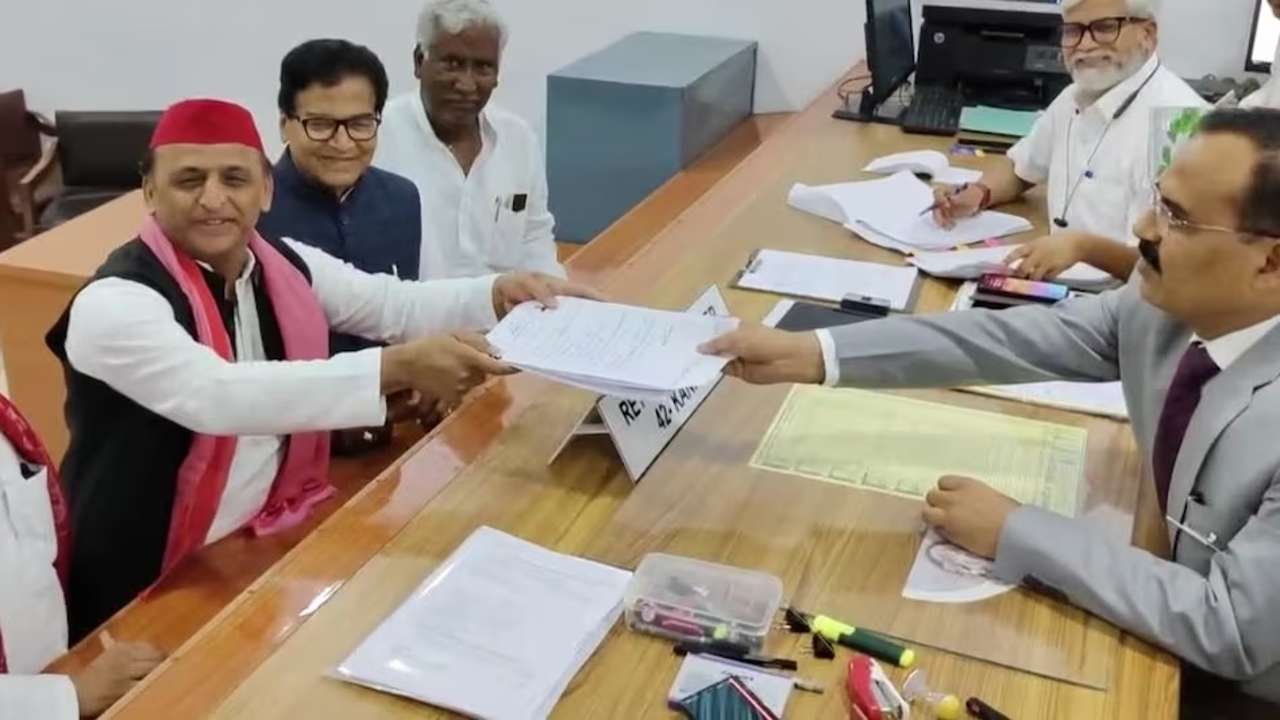
Samajwadi Party (SP) chief Akhilesh Yadav, submitted his nomination for the Kannauj Lok Sabha constituency ahead of tomorrow’s second round of voting. In front of Ram Gopal Yadav and other party leaders, the chief of the SP, who had previously contested the seat in 2000, 2004 and 2009, submitted the nomination.
Speaking with media, Ram Gopal Yadav said that SP would win the seat by a huge margin. The BJP candidate might lose his deposit in the seat, he said.
The Samajwadi Party has completely reversed its earlier plan to field former Mainpuri MP Tej Pratap Singh Yadav as their candidate, which is a significant political development.
Earlier, Akhilesh Yadav told reporters, people will find out when the nomination takes place, in reference to the speculations that he will contest for the seat. The historic victory of Kannauj is the subject of inquiry.
The former chief minister continued, the people have decided that the India bloc is coming as the future and the BJP will be history in this election.
Notably, elections for the Kannauj seat are scheduled for May 13, which would intensify the political drama that is now playing out in Uttar Pradesh. Previously regarded as the Samajwadi Party’s stronghold, the seat was lost by the party in the 2019 election when Subrat Pathak of the BJP won with a resounding victory.
The candidates competing for the following Uttar Pradesh seats will find out their destiny in the second round of voting, which is scheduled for tomorrow, Amroha, Meerut, Mathura, Baghpat, Aligarh, Ghaziabad, Gautam Buddh Nagar, and Bulandshahar.
Notably, two Bollywood celebrities running as BJP candidates in the second round are Hema Malini from Mathura and Arun Govil from Meerut. There are 91 contestants from UP competing in the second phase.
The seats in Gautam Buddha Nagar and Mathura are up for grabs, with a maximum of 15 applicants per seat. In Bulandshahr, six candidates are vying for the presidency. There are twelve contenders running in Amroha, eight in Meerut, seven in Baghpat, and fourteen in Ghaziabad and Aligarh.
1,67,77,198 votes will decide these candidates’ fates.
-
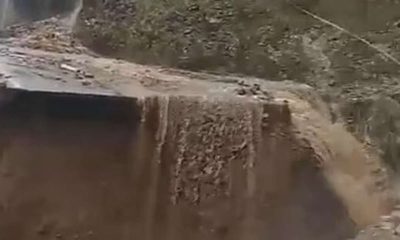
 India News9 hours ago
India News9 hours agoLandslide hits Arunachal Pradesh, highway linking Indo-China border affected
-
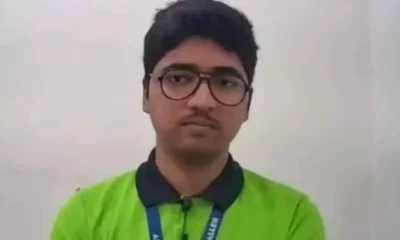
 Education7 hours ago
Education7 hours agoFarmer’s son Nilkrishna Gajare Nirmalkumar from Maharashtra scores 100 NTA score in IIT-JEE Mains 2024
-

 Entertainment9 hours ago
Entertainment9 hours agoBollywood stars Salman Khan, Alia Bhatt, Rekha, Sonakshi Sinha, Aditi Rao Hydari attend Sanjay Leela Bhansali’s Heeramandi premiere
-

 India News10 hours ago
India News10 hours agoTamannaah Bhatia summoned in illegal IPL streaming app case, to appear before cyber cell on April 29
-
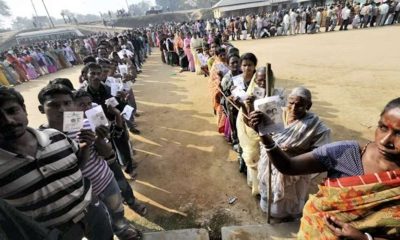
 2024 Lok Sabha Elections9 hours ago
2024 Lok Sabha Elections9 hours agoBihar: Election Commission extends voting timings for 4 Lok Sabha seats due to heatwave
-

 Cricket news10 hours ago
Cricket news10 hours agoIPL 2024: Rishabh Pant, Axar Patel score half centuries as Delhi Capitals beat Gujarat Titans by 4 runs
-
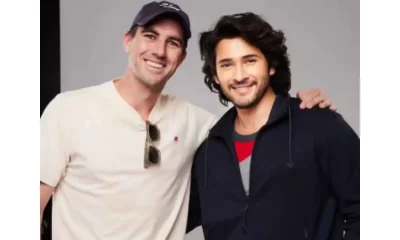
 Cricket news3 hours ago
Cricket news3 hours agoTelugu superstar Mahesh Babu meets SRH captain Pat Cummins, says it is an absolute honour
-
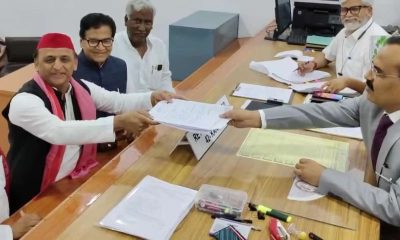
 2024 Lok Sabha Elections8 hours ago
2024 Lok Sabha Elections8 hours agoLok Sabha elections: Samajwadi Party chief Akhilesh Yadav files nomination from Kannauj

